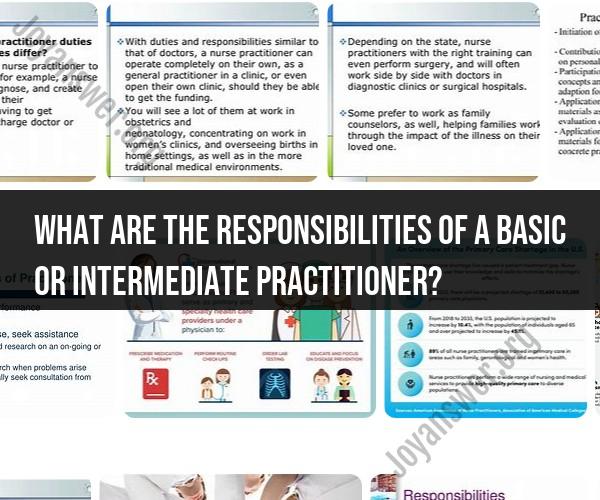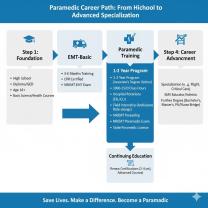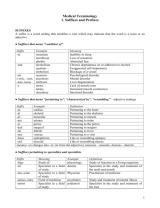What are the responsibilities of a basic or intermediate practitioner?
The responsibilities of basic and intermediate practitioners can vary depending on the field, industry, and specific job roles. These terms are often used in healthcare, but they can apply to various professions. Here are some general responsibilities associated with basic and intermediate practitioners in different fields:
Basic Practitioner Responsibilities:
Entry-Level Duties: Basic practitioners typically handle entry-level tasks and responsibilities in their field. They may be involved in routine, less complex activities and provide support to more experienced professionals.
Learning and Training: They focus on learning and acquiring the fundamental skills, knowledge, and techniques necessary for their profession. This often involves formal education or on-the-job training.
Assistance and Support: Basic practitioners provide assistance and support to more experienced colleagues. They may work under the guidance of intermediate or advanced professionals.
Documentation: Basic practitioners are often responsible for documenting information, data, or patient/client records accurately and thoroughly.
Safety and Compliance: They must adhere to safety protocols and regulatory requirements in their field to ensure the well-being of individuals, patients, or clients.
Client or Patient Interaction: In healthcare or related fields, basic practitioners may interact directly with clients, patients, or customers, often under supervision, to provide basic services or information.
Teamwork: They collaborate with other team members, following instructions and contributing to the team's goals and objectives.
Intermediate Practitioner Responsibilities:
Advanced Skills: Intermediate practitioners have a deeper level of knowledge and skills compared to basic practitioners. They can perform more complex tasks and handle responsibilities with a higher level of independence.
Client or Patient Care: In healthcare, intermediate practitioners are often involved in patient care, treatment planning, and the administration of therapies or procedures. They may have more direct patient interactions.
Problem-Solving: Intermediate practitioners are expected to solve problems and make decisions within their area of expertise. They may have to adapt to changing situations and address challenges.
Supervision and Training: They may provide guidance and training to basic practitioners or support staff. They help mentor and develop the skills of those in entry-level roles.
Documentation and Record Keeping: Like basic practitioners, intermediate practitioners maintain accurate records and documentation, but they may be responsible for more complex or specialized documentation.
Communication and Reporting: They communicate with other healthcare professionals, team members, and, in some cases, patients or clients, providing explanations, updates, and recommendations.
Quality Assurance: In various fields, intermediate practitioners often play a role in ensuring the quality and accuracy of services, products, or processes. They may conduct quality checks or audits.
Safety and Compliance: They are responsible for adhering to safety and regulatory guidelines, as well as ensuring that their work and the work of their team complies with industry standards.
Decision-Making: Intermediate practitioners may have the authority to make certain decisions within their scope of practice, often with input from more experienced professionals.
It's important to note that the specific responsibilities of basic and intermediate practitioners can vary widely across different professions and industries. These roles are often part of a career progression, with individuals advancing from basic to intermediate roles as they gain experience and expertise in their chosen field.
Responsibilities of a Basic or Intermediate Practitioner: What to Expect
The responsibilities of a basic or intermediate practitioner vary depending on the field and the specific role. However, there are some common responsibilities that most basic and intermediate practitioners share. These include:
- Providing direct services to clients or patients
- Assisting more experienced practitioners with their work
- Completing administrative tasks
- Continuing their education and training
Basic and intermediate practitioners often work under the supervision of more experienced practitioners. This allows them to learn from the experience of others and to develop their own skills and competencies.
Entry-Level and Early Career Roles in Various Fields
There are many different entry-level and early career roles available in a variety of fields. Here are a few examples:
- Healthcare: Medical assistant, registered nurse, licensed practical nurse, dental hygienist, physical therapist assistant, occupational therapist assistant
- Education: Teacher's aide, instructional aide, special education aide, school counselor
- Social work: Caseworker, social worker assistant
- Business: Administrative assistant, customer service representative, sales representative, marketing associate
- Technology: Software engineer, web developer, IT support specialist
These are just a few examples, and there are many other entry-level and early career roles available in a variety of fields.
Developing Skills and Competencies in Basic and Intermediate Positions
Basic and intermediate practitioners can develop their skills and competencies in a number of ways. Here are a few tips:
- Seek out opportunities to learn from more experienced practitioners. Ask questions, shadow them, and volunteer to help them with their work.
- Take advantage of training and development opportunities. Many employers offer training programs and classes to help their employees develop their skills.
- Network with other professionals in your field. Attend industry events, join professional organizations, and connect with people on LinkedIn.
- Stay up-to-date on the latest trends and developments in your field. Read industry publications, attend conferences, and take online courses.
Advancement Pathways and Career Progression
There are many different advancement pathways and career progression opportunities available to basic and intermediate practitioners. Some practitioners may choose to stay in their current role and develop their skills and expertise in that area. Others may choose to move into more senior roles or to take on additional responsibilities.
Some common advancement pathways for basic and intermediate practitioners include:
- Moving into a supervisory role. This may involve overseeing other practitioners or managing a team.
- Taking on more complex or specialized work. This may involve working with more challenging clients or patients, or conducting research or writing reports.
- Moving into a different role or department. This may involve working in a different area of the organization or in a different field altogether.
Success Stories and Insights from Basic and Intermediate Practitioners
Here are a few success stories and insights from basic and intermediate practitioners:
- "I started out as a medical assistant, but I was always interested in becoming a nurse. I took advantage of training and development opportunities offered by my employer, and I eventually got my RN license. I now work as a registered nurse in a busy hospital setting."
- "I started out as a teacher's aide, but I realized that I wanted to be a teacher myself. I went back to school to get my teaching degree, and I now teach third grade at a public school. I love my job, and I'm grateful for the opportunity to make a difference in the lives of my students."
- "I started out as a customer service representative, but I was always interested in marketing. I took online courses and volunteered to help with marketing projects at my company. I was eventually promoted to a marketing associate role, and I'm now working on a campaign to launch a new product."
These are just a few examples, and there are many other success stories from basic and intermediate practitioners. With hard work and dedication, it is possible to achieve your career goals and make a difference in your field.
If you are a basic or intermediate practitioner, remember that you are not alone. There are many other people who have been in your shoes and have achieved success. By developing your skills and competencies, taking advantage of learning opportunities, and networking with other professionals, you can advance your career and achieve your goals.











